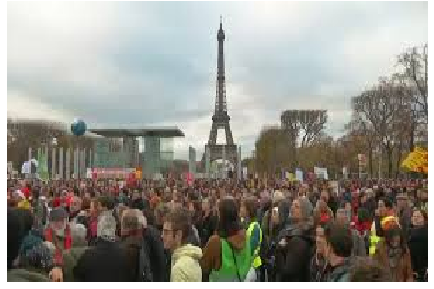Cop21: Too Early To Celebrate?
Protests in Paris recently against the COP21 agreement

Amid much fanfare, jubilation, and a standing ovation, delegates from member countries of the United Nations Framework Convention on Climate Change, adopted the Paris Climate Change Agreement at about 7.30 pm, a full one day later than scheduled. Two long weeks of negotiations and lobbying ended up in a draft agreement, which will now be open to ratification of each member nation from April 2016 onwards. Hailed by many as a turning point in the history of climate change, there is also enough criticism to question the feasibility entire agreement. The word remains divided about whether the Agreement has been able to achieve all that is set out for. The Citizen analyses some of the ambitious promises made by the Agreement.
The Agreement, by the virtue of the fact that it was drafted and adopted is considered a success, for the 2009 Copenhagen Conference failed to even bring member countries to an agreement. The Paris Climate Change Agreement calls for “holding the increase in the global average temperature to well below 2°C above pre-industrial levels and to pursue efforts to limit the temperature increase to 1.5°C above pre-industrial levels.”
This is considered as one of the biggest achievements of the agreement, as it clearly lays the target for increase in temperatures. However, critics say, this could be misleading. Considering the fact that the implementation of this agreement begins in 2020, the time window to restrict the rise in temperatures would already have passed; and the eventual rise could be 3 or even 4 degrees. Furthermore, the inclusion of 1.5 degrees remains merely aspirational in nature, and it would take revolutionising the energy, transport, housing, lifestyle, economy and business beginning today to achieve the same. Rakesh Kamal, Programme Officer (Climate Change) says, “The time was ripe to make changes much more than the ones that have been envisioned, for such an opportunity is not going to come up in the foreseeable future. The ambiguity in the areas of finance, climate justice, equity, and setting and revising INDCs could become a potential issue in the future, especially for India. Some development has been made, which is a positive outcome, however, if the same is enough to restrict the temperatures to 2 degrees seems highly unlikely.”
The agreement also has a provision to “reach global peaking of greenhouse gas emissions”, which holds special relevance for countries like India. This is seen a crystal-clear message to the world, that the age of fossil fuels is ending, and a major shift in the energy production and consumption is underway. However, lobbying by OPEC countries resulted in the removal of the provision, “reaching greenhouse gas emissions neutrality in the second half of the century”, which was included in the previous version. Furthermore, doubts have been cast over USA’s willingness to phase out fossil fuels. Renowned climate scientist James Hansen has been extremely vocal in expressing his disappointment, and has been quoted saying, “It’s just worthless words. There is no action, just promises. As long as fossil fuels appear to be the cheapest fuels out there, they will be continued to be burned.”
All countries are expected to submit updated plans, and also be subjected to a universal system of review, every five years, in order to monitor the climate change efforts. However the formulation of such a mechanism has been pushed to the future. Additionally, even though reporting these requirements and plans is legally binding, but setting emissions targets for individual countries is non-binding. The Paris Agreement calls on nations to establish “a new collective quantified goal” of at least $100 billion a year in climate-related financing from 2020. However, the $100 billion figure appears only in the text’s preamble, not in any legally binding portions of the agreement. Pushkar Vaidya, Chief Scientist and Founder, The Indian Astrobiology Research Centre, says, “The finance aspect of the debate as a major concern, has existed, and will continue to exist, even decades from now. This is just another trial to see if funds can be gathered.”
Panning the Agreement and ‘weak’ and ‘un-ambitious’, a Centre for Science and Environment calls it, a ‘compromise’, and says that developed countries got their way. “The phrase ‘historical responsibility’ has been erased from the agreement and this weakens the obligations of developed countries to take actions due to their past emissions. Without historical responsibility, equity will now be interpreted only through the words ‘respective capabilities and national circumstances’ further removing differentiation between the climate actions of developed and developing countries,” said Chandra Bhushan, deputy director general, CSE, in a press release. Rakesh Kamal, explaining further says, “As a country, India wanted five key issues, like equity, finance, carbon budgeting, technology transfer and IPR etc to be considered in the final agreement, but only half of these issues were addressed that too not in their entirety.”
However, some scientists are also calling it the best possible deal under the circumstances. Vaidya, remaining optimistic says, “The platform of COP must be viewed as an incremental one. The best it can achieve is to set the base, and initiate action. India did a fairly good job in addressing the issues that were of concern, and played hardball well enough. However, the fact that the monitoring and updating the INDCs will be a central process could become problematic in the future.”
Thus, even though the euphoric sentiment on forging the Climate Agreements persists all around the globe, and within the country, doubts have been raised by various stakeholders. The results of the agreement will only be visible a decade from now, when the states reconvene in 2023 to assess and realign their goals. However, the current state of affairs can be best understood by the statement made by Miguel Arias Cañete, the European Union’s Commissioner for Energy and Climate Action, “Today, we celebrate. Tomorrow, we have to act. This is what the world expects of us.”



